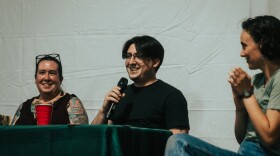From physical ailments to post-traumatic stress disorder - the health issues facing veterans are getting much more attention than they used to. In the Milwaukee area, most of the care veterans of all ages receive happens through the Veterans Administration and the Clement Zablocki VA Medical Center. But the VA doesn’t always go it alone.
This Friday, experts from the VA will team up with the Military and Veterans Resource Center and LGBT Resource Center at UW-Milwaukee to present their fifth annual mental health summit. It’s open to all veterans and the community at large. But this year, the day-long event focuses particularly on issues faced by LGBTQ+ veterans.
"There is so much internalized homophobia, there's a lot of discrimination they experience in society. There's a lot of minority stress that they have to deal with."
"LGBT veterans are dealing with the exact same issues that all veterans are dealing with," says Dan Flave-Novak, an LGBT Mental Health post-doctoral fellow at the Clement Zablocki VA Center in Milwaukee.
The post-doctoral fellowship is one of nine similar programs in VA hospitals throughout the country, which specialize in treating LGBT veterans. While many of the veterans whom Flave-Novak interacts with are struggling with PTSD, anxiety, and various mental illnesses like other veterans, he says these issues are decidedly more prevalent among LGBT veterans.
"Unfortunately, what we see a lot of times is that LGBT individuals have higher rates of mental health issues than the general public," he explains. "The reason for that is, you know, there is so much internalized homophobia, there's a lot of discrimination they experience in society. There's a lot of minority stress that they have to deal with. Because of those issues, they're a lot of times really struggling."
"There are veterans who are seeking care at the VA medical center who are still confused about their ability to be open and identify who they are."
It's important to note that many of the veterans seeking care through the VA served at a time when homosexuals were not allowed to serve in the military. Although LGBT people have been able to serve since 1994 when the "Don't Ask Don't Tell," policy was instituted, the policy barred them from openly discussing their sexuality. The policy was officially repealed in 2011, but its legacy remains.
"There are veterans who are seeking care at the VA medical center who are still confused about their ability to be open and identify who they are," says Raymond Konz-Kryzminski, a social worker at the Clement Zablocki VA Center.
Konz-Kryzminski says that LGBT veterans, like other LGBT people, often need to gauge the social attitudes of their health care professionals to figure out if they're in a safe environment. "The practitioners at the VA, the patients at the VA really need to be aware of where people are at with their ability to be open about who they are and how to meet patients where they're at," he says.
"The VA realizes that veterans don't come home to the VA, they come home to their families, their communities. So if we can heal those individuals, we can heal those families and communities."
Kimberly Stuart is a graduate student at UW-Milwaukee and executive director of the area nonprofit, Veterans for Diversity. She says that making sure LGBT veterans get the care they need is not only a benefit to the veterans, but ultimately, their families and communities.
"The VA realizes that veterans don't come home to the VA, they come home to their families, their communities. So if we can heal those individuals, we can heal those families and communities," she says.
The Zablocki VA Medical Center’s fifth annual mental health summit takes place at the UWM Union all day Friday, June 16. The event is free and open to the public.







